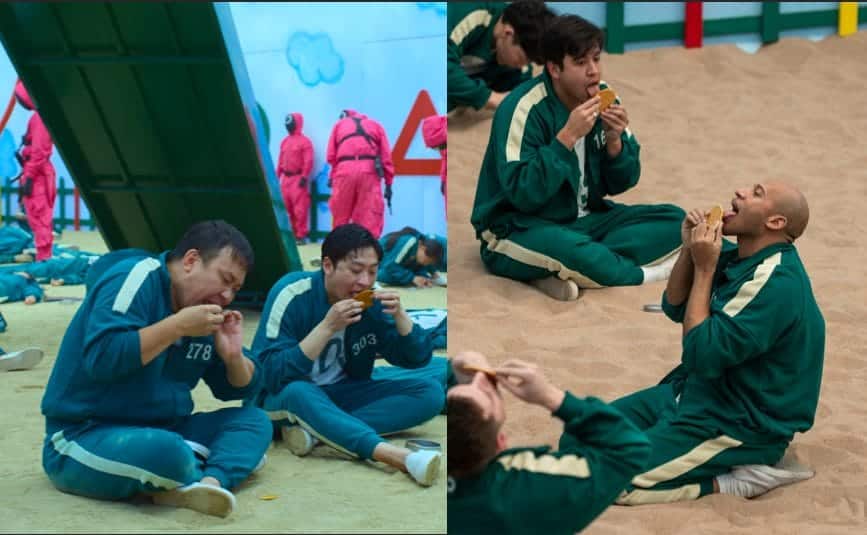Director Hwang Dong-hyeok made cinematic history in 2021 with the Netflix drama, “Squid Game,” where players compete in children’s games to win a cash prize.
The series garnered worldwide critical acclaim and accolades for its directing, acting, producing, and social commentary. The series not only showcases how capitalism impacts society’s vulnerable and the ones in power, but also the lengths that people can go to earn money.
Studio Lambert and The Garden’s “Squid Game: The Challenge,” shows exactly that… just not in the way they might’ve intended. From low viewership to unsafe working conditions, here are the reasons why the reality show fell short of making the social statement they wanted to.
The Shift from Dystopian to Reality Wasn’t Smooth
While the South Korean thriller took place in the modern-day, some storylines, such as the undercover police, remind audiences that the series is fictional. However, the idea that corrupt groups can host cruel death games for pleasure is still frightening. There is no guarantee it might be a reality on the dark web or black market that we are unaware of.
“Squid Game: The Challenge” is different. The reminder of capitalism and the contestants’ financial troubles are not present. In an interview with Entertainment Weekly, Dong-hyuk even states, “What I hope is that they will be carrying on my vision and intention as much as possible for the show.”
Yet, despite the detailed sets and costumes, the essence of the show is lost with a fight for screentime. Many of the contestants express that the reality TV show amplifies their social media following. Not only is the cash prize digital, but tax laws prevent the winning player from receiving the full amount.
Unlike the deaths that symbolize a player’s elimination in the series, the contestants carry ink pouches that detonate when eliminated. This not only takes away the ‘thrill’ from the ‘thriller,’ but raises more questions about other limitations the show has.
The Favoritism From Producers
Like any reality TV show, the possibility of rigging behind-the-scenes is high. Audiences know that scenes are scripted, but in a competition game based on the series’ challenges, the strategy doesn’t cut it.

The purpose of the original show was to maintain a fair game for all — with the rigging happening amongst players. Anonymous players from the reality TV show, however, alleged that producers altered storylines for players to keep them longer.
Players who spoke to Rolling Stone added producers went as far as having eliminated players rejoin the game for conflict. “It wasn’t a game show … it was a TV show, and we were basically extras,” one player said.
Another contestant saw the producers add more time to the “Red Light, Green Light” challenge to ensure certain players passed. Three other players experienced a “38-second massacre” when contestants who thought they passed the first challenge were eliminated.
Netflix refuted those claims in statements to Rolling Stone and Variety. “Any suggestion that the competition is rigged or claims of serious harm to players are simply untrue,” they said.
While the rigging allegations focus behind-the-scenes, what about the unfair advantages shown on-camera? In episode 1, players 101 and 134 are given the opportunity to eliminate another player. They receive the “honor” because they were alone in the kitchen to hear the direction from the intercom. Luck? Or predetermined advantage?
In episode 4, one player received a jack-in-the-box containing a challenge. They then get eliminated immediately before the audience even sees what the box’s advantage was. In the original series, cheating or outside help is shamed and forbidden, yet in the reality TV show, it’s celebrated.
The Ironic Viewership Roles
Without the V.I.P’s, “Squid Game” would not have been created, much like the dystopian world of “The Hunger Games,” the rich and powerful watched and bet money on the contestants.
Since the Squid Games took place annually, only a group of elite men were invited to watch the final spectacles of players fighting to the death to win the cash prize.
The V.I.P’s sat in luxurious couches, watching from windows and screens from the comfort of their own… oh.
The original series highlights the irony of capitalism erasing morality as the rich watch the vulnerable suffer with the limited resources they have. Instead of donating money, food, or housing, they entertain themselves by watching people suffer to get a glimpse of the money they have.
Ironically… “Squid Game: The Challenge” used the most sadistic elements of social commentary to create a reality show people have to audition for. The show then takes advantage of the contestants by creating ways to entertain audiences at home at the players’ expense.
Netflix, one of the biggest streaming services, airing a fictional satire, then releasing a reality show inspired by the cruelty, with new challenges to torment the real players is satire itself. Additionally, having the viewers laugh and judge the players through a screen as they sit in the comfort of their own homes is comedy enough… but at whose expense?
Viewers pay money to the streaming service, which continues to make more money than the winning prize every day, to watch desperate people fight for money — it’s incredible, really… the world we live in.
The Lawsuit Threats From Former Contestants
Last, but certainly not least, the lawsuit threats. Just one day after the reality show premiered on Nov. 23, a British injury firm, Express Solicitors, stated that two former contestants reached out for a potential lawsuit.

“We are gathering further evidence before filing court action if necessary,” the firm said. The contestants alleged that they suffered from hypothermia and inhumane working conditions.
Filming for the show commenced in January, when parts of the United Kingdom — the filming location — had a cold snap, causing freezing temperatures. Contestants played “Red Light, Green Light” in an airplane hangar, where they stood in freezing temperatures for hours.
In a Rolling Stone article published the week after the allegations, four contestants shared gruesome details about their experience filming the game. “My legs went completely numb,” one player said, saying she got an ear infection and pneumonia from the first game.
Play 385 infamously squatted and stayed still when the players had to freeze, what audiences did not know at the time was that she held the position for 30 minutes. The entirety of the game lasted 5 minutes on screen, but filming took at least 9 hours.
One player detailed the horrifying scene of watching another player convulse from the dangerous temperatures. “People were beating themselves up, including myself, around the fact that you’ve got a girl convulsing, and we’re all stood there like statues,” they said. “It’s a social experiment. It played on our morals, and it’s sick. It’s absolutely sick.”
Reality TV has always been about the entertainment for audiences. While this is not the first time Netflix contestants have come forward about unfair living conditions and practices, “The Challenge” reinforces the absence of morality. Players audition and sign NDAs to boost their popularity status, get screentime and exposure, and compete to win money. The show pays homage to the original in interesting ways and executes entertainment perfectly.
“Squid Game: The Challenge” episodes one through ten are available to stream on Netflix now.














